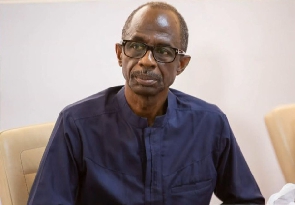- Home - Sports
- Soccer Portal
- Archived Sports News
- Sports Videos | TV
- Year In Review
- Sports Photos
- Sports Headlines
- Boxing
- Athletics
- Basketball
- Bodybuilding
- Cricket
- Golf
- Handball
- Hockey
- Martial Arts
- Tennis
- Volleyball
- Other Sports

General News of Wednesday, 18 April 2001
Source: GNA
Kufuor calls for a public debate on pay structure
President John Agyekum Kufuor on Wednesday called for a public debate on incomes and prices with a view to streamlining the 'unrealistic pay structure' of workers.
He said to ensure smooth supply of basic and critical services, to cut out corruption and remove temptation from public officials, who provide these services, Ghana must accept the challenge to face up to the most basic problem of realistic pricing.
"Not until we face these realities, our economy on the larger scale and our institutions on the smaller scale will be run on the stop-go, ad-hoc and distorted system that has characterised our lives since independence."
President Kufuor, who was addressing a press conference at the Castle to mark his 100 days in office, said, "one of the thorniest problems of our economy is the unrealistic structure of pay and prices.
"Right from what the President is paid, which is 1.9 million cedis (about 280 dollars) a month, to what the labourer gets against what we pay for consumables and utilities are all out of joint."
The 90-minute interaction with President Kufuor, flanked by Ministers of State, Parliamentarians and some executive members of the New Patriotic Party (NPP), centred on the state of the economy, politics and social issues.
President Kufuor explained that the government having taken a long-term view of the economic situation globally provided the background for the removal of subsidies on petroleum products.
"In the same vein, we are seeking realistic prices for such basic commodities as water and electricity. Facing up to this challenge will bring along with it the desired productivity and will in turn yield better wages and pricing."
On the Highly Indebted Poor Countries (HIPC) initiative, President Kufuor said government opted for it to give it a respite from debt payments and release available resources for the immediate task of social investment.
The savings made would be used to reduce poverty, promote growth in the rural areas and government on its part would be efficient in managing its finances and would borrow only when it is needed.
"We have started the HIPC negotiations with a view to obtaining the best terms and advantages for this country."










